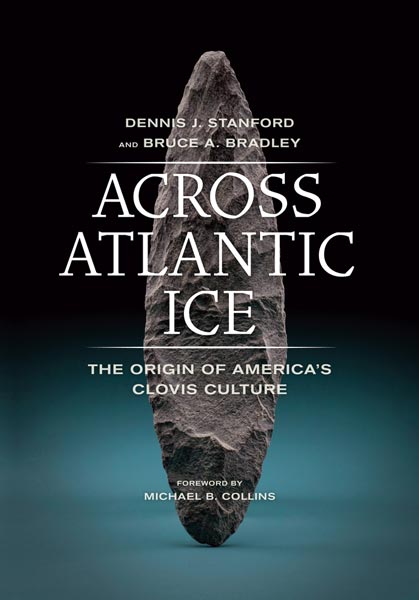 Across Atlantic Ice Across Atlantic Ice
The Origin of America's Clovis Culture
Dennis J. Stanford and Bruce A. BradleyNarrated by Christopher Prince
Available from Audible
Book published by University of California Press
Who were the first humans to inhabit North America? According to the now familiar story, mammal hunters entered the continent some 12,000 years ago via a land bridge that spanned the Bering Sea. The presence of these early New World people was established by distinctive stone tools belonging to the Clovis culture. But are the Clovis tools Asian in origin? Drawing from original archaeological analysis, paleoclimatic research, and genetic studies, noted archaeologists Dennis J. Stanford and Bruce A. Bradley challenge the old narrative and, in the process, counter traditional—and often subjective—approaches to archaeological testing for historical relatedness. The authors apply rigorous scholarship to a hypothesis that places the technological antecedents of Clovis in Europe and posits that the first Americans crossed the Atlantic by boat and arrived earlier than previously thought. Supplying archaeological and oceanographic evidence to support this assertion, the book dismantles the old paradigm while persuasively linking Clovis technology with the culture of the Solutrean people who occupied France and Spain more than 20,000 years ago.
Dennis J. Stanford
is Curator of Archaeology and Director of the Paleoindian Program at the Smithsonian’s National Museum of Natural History. Among his books is Ice Age Hunters of the Rockies.
Bruce A. Bradley
is Senior Lecturer in Archaeology at the University of Exeter and Director of its Experimental Archaeology Programme. His books include Clovis Technology.
REVIEWS:
“North America's first peoples were long thought to be Asians who migrated over the Bering land bridge some 12,000 years ago, bringing with them the tools of the Clovis culture. Now archaeologists Dennis Stanford and Bruce Bradley have radically recast the story. Drawing on climatic, genetic and archaeological evidence, they argue that the roots of Clovis culture rest in the Solutrean people of Spain and France, who sent some of their number across the Atlantic in boats 18,000 years ago.”
—Nature “Across Atlantic Ice is brilliant and ground-breaking. As fascinating as it is controversial, this book brings together decades of research from diverse areas into a single volume that is well argued, factually rich, elegantly written—and absolutely riveting. I could not put it down.”
—Douglas Preston, author of Cities of Gold and former archaeology correspondent for The New Yorker “In their well-written and well-reasoned exploration of the first inhabitants of the Americas, Dennis Stanford and Bruce Bradley have provided a viable alternative scenario. I am not a trained professional, but I have been reading the archeological literature for thirty-five years. Their argument is logical and should be given an open-minded hearing.”
—Jean M. Auel, author of The Land of Painted Caves and The Clan of the Cave Bear “This carefully crafted, well-researched book aims to change our thinking of who the first Americans were and where they came from. Stanford and Bradley have produced an ambitious, interdisciplinary study of a neglected route of early entry into the Americas that will affect the way the larger narrative of the first chapter of human history in the New World is written.”
—Tom D. Dillehay, author of The Settlement of the Americas: A New Prehistory TABLE OF CONTENTS:
Foreword by Michael B. Collins
Introduction: The First Americans?
Part 1. Paleolithic Peoples
1. Flaked Stone Technology: A Primer
2. Clovis: The First American Settlers?
3. Beringia: Out of Asia on Foot
4. Challenging the Clovis First Model: The Missing Links
5. The Solutrean: Ice Age Innovators
Part 2. The Solutrean Hypothesis
6. Quantitative Culture Comparison
7. Qualitative Culture Comparison
8. The Solutrean Maritime Adaptation
9. The Last Glacial Maximum: How Bad Was the Weather?
10. Living on the Ice Edge: Ethnographic Analogies
Conclusion
|

